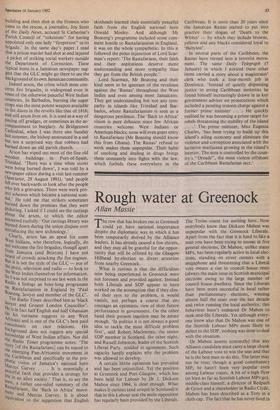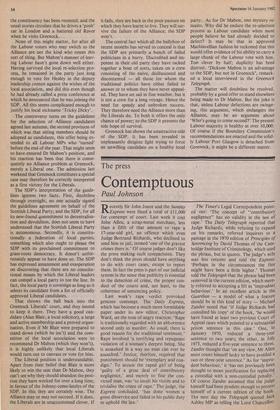Rough water at Greenock
Allan Massie
The row that has broken out at Greenock could yet have national importance despite the diplomatic way in which it has been temporarily shelved by the Alliance leaders. It has already caused a few shivers, and they may all be grateful for the oppor- tunity that will be offered by the Glasgow HilIhead by-election to divert attention from nearby Greenock.
What is curious is that the difficulties now being experienced in Greenock were not foreseen and provided against. Instead both Liberals and SDP appear to have worked on the assumption that if they clos- ed their eyes to the problem, it would vanish; not perhaps a course that en-, courages an optimistic view of their future performance in government. On the other hand their present inaction may be astute enough. 'In politics it is not always a good idea to tackle the most difficult problem first', said Robert Maclennan, the senior SDP member in Scotland, the other night, and Russell Johnston, leader of the Scottish Liberal Party, nodded in agreement. Such sagacity hardly explains why the problem was allowed to develop.
A certain blithe optimism has prevailed and has been unjustified. Yet the position at Greenock and Port Glasgow', which has been held for Labour by Dr J. Dickson Mabon since 1964, is clear enough. What makes it curious (and unique in Scotland) is that in this Labour seat the main opposition has regularly been provided by the Liberals. The Tories count for nothing here. Now everybody knew that Dickson Mabon was unpopular with the Greenock Liberals. Apart from the fact that it is hard to like a man you have been trying to unseat in five general elections, Dr Mabon, unlike many MPs, has been regularly active in local elec- tions, standing on street corners with a megaphone and threatening that a Liberal vote means a rise in council house rents (always the main issue in Scottish municipal elections owing to the large number of council house dwellers). Since the Liberals have been more successful in local rather than parliamentary elections, winning almost half the seats over the last decade and twice running the local authority, this behaviour hasn't endeared Dr Mabon to rank-and-file Liberals. Yet although every- one knew also that Dr Mabon was one of the Scottish Labour MPs most likely to defect to the SDP, nothing was done to deal with the situation.
Dr Mabon asserts (correctly) that any Alliance candidate must carry a large chunk of the Labour vote to win the seat and that he is the best man to do this. The latter may not be true; though a good constituency MP, he hasn't been very popular even among Labour voters. A bit of a high flyer (at least as far as Scottish Labour MPs go), middle-class himself, a director of Redpath de Groot and a shareholder in Radio Clyde, Mabon has been described as a Tory in a cloth cap. The fact that he has never lived in the constituency has been resented; and the usual stories circulate that he drives a 'posh' car in London and a battered old Rover when he visits Greenock.
None of this might matter, for after all the Labour voters who may switch to the Alliance are not the kind who resent this sort of thing. But Mabon's manner of leav- ing Labour hasn't gone down well either. Having survived the local re-selection pro- cess, he remained in the party just long enough to vote for Healey in the deputy leadership contest against the wishes of the local association, and did this even though he had already called a press conference at which he announced that he was joining the SDP. All this seems complicated enough to justify his local nickname 'Tricky Dicky'.
The controversy turns on the guidelines for the selection of Alliance candidates agreed last autumn, the second provision of which was that sitting members should be adopted as candidates, this offer being ex- tended to all Labour MPs who 'turned' before the end of the year. That might seem to have ensured Dr Mabon's position, and his reaction has been that there is conse- quently no Alliance problem at Greenock, merely a Liberal one. The admission last weekend that Greenock constitutes a special case may therefore be correctly interpreted as a first victory for the Liberals.
The SDP's interpretation of the guide- lines ignores two facts. First, doubtless through oversight, no one actually signed the guidelines agreement on behalf of the Scottish Liberal Party; and the SDP, for all its new-found commitment to decentralisa- tion and devoltition, does not seem to have understood that the Scottish Liberal Party is autonomous. Secondly, it is constitu- tionally a federation of local parties, something which also ought to please the SDP with its proclaimed commitment to grass-roots democracy. It doesn't unfor- tunately appear to have done so. The SDP has expressed amazement and exasperation on discovering that there are no constitu- tional means by which the. Liberal leaders can compel a local party to toe the line. In fact, the local party is sovereign as long as it selects its candidate from a list of officially approved Liberal candidates.
That throws the ball back into the Greenock Liberals' court, and they intend to keep it there. They have a good can- didate (Alan Blair, a local solicitor), a large and active membership and a proved organ- isation. Even if Mr Blair were prepared to stand down (which he isn't) and the com- mittee of the local association were to recommend Dr Mabon (which they won't), it is highly unlikely that local Liberals. would turn out to canvass or vote for him.
The Liberal position is understandable. Apart from their belief that Blair is more likely to win the seat than Dr Mabon, they can't see why they should abandon the posi- tion they have worked for over a long time, in favour of the Johnny-come-latelys of the SDP. In this they are certainly wise. The Alliance may or may not succeed. If it does, the Liberals are in unaccustomed clover. If it fails, they are back in the poor pasture on which they have learnt to live. They will sur- vive the failure of the Alliance; the SDP won't.
The central fact which all the ballyhoo of recent months has served to conceal is that the SDP are primarily a bunch of failed politicians in a hurry. Discredited and im- potent in their old party they have tacked together a boat of sorts, taken on a crew consisting of the naive, disillusioned and discontented — all those for whom the traditional politics have either failed to answer or to whom they have never appeal- ed. They have set sail in fine weather, but it is not a crew for a long voyage. Hence the need for speedy and unbroken success. They therefore need the Alliance more than the Liberals do. To both it offers the only chance of power; to the SDP it presents the sole hope of survival.
Greenock has shown the unattractive side of the SDP. It has been revealed in unpleasantly dirigiste light trying to force an unwilling candidate on a healthy local
party. As for Dr Mabon, one mystery re- mains. Why did he endure the re-selection process as Labour candidate when most people believe he had already decided to defect? It may be that in approved Machiavellian fashion he reckoned that this would offer evidence of his ability to carry a large chunk of the Labour vote with him. Too clever by half; duplicity has bred distrust. 'Dickson Mabon is an advantage to the SDP, but not in Greenock', remark- ed a local interviewed in the Greenock Telegraph.
The matter will doubtless be resolved, probably by a good offer to stand elsewhere being made to Dr Mabon. But the joke is that, unless Labour defections are swinge- ing, this argument, which endangers the Alliance, may be an argument about `Who's going to come second?' The present Labour majority is healthy at over 10,000. Of course if the Boundary Commission's recommendations are enacted and the solid- ly Labour Port Glasgow is detached from Greenock, it might be a different matter.



































 Previous page
Previous page